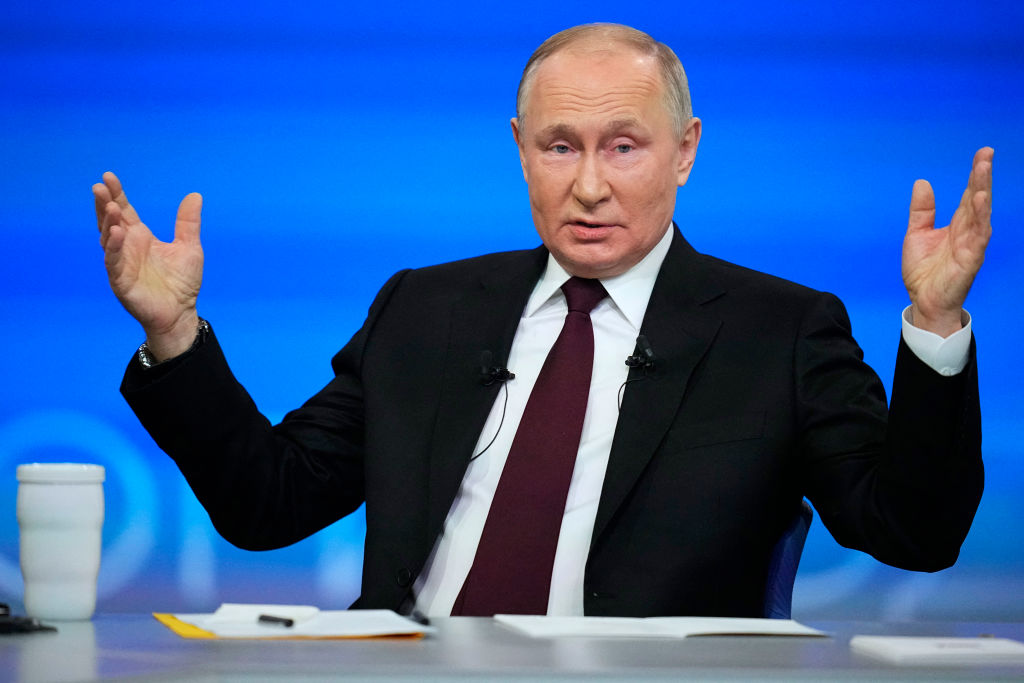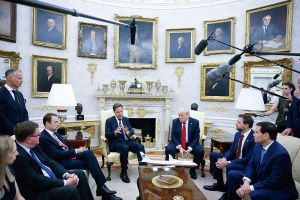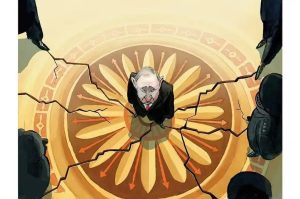From time to time, the czar must listen to the complaints of his subjects. Having dodged this duty last year, Vladimir Putin has an election looming, so held a press conference. While he punished his viewers in the process with a performance of stupefying boredom, nonetheless Thursday’s event gave us a sense of his election strategy.
Once a year Putin traditionally held a press conference and also his Direct Line event, a kind of town hall at which he would field questions from around the country. Both were marathon events that peaked at over four and a half hours, respectively, and they were opportunities for him not just to connect with his people but also demonstrate his mastery of his brief. A key element of the Direct Line events was always his seizing on local issues and demanding action of the local authorities, which also meant that citizens and communities vied to get their concerns aired. One third father of the nation, one third details-oriented national CEO, one third the micromanager willing to give his underlings a kicking when they weren’t up to scratch. It has to be acknowledged that he could be quite impressive.
Over time, Putin clearly became bored, and in 2020, the two were combined, and last year neither ran at all, as the spinning of Putin’s “special military operation” in Ukraine proved too great a challenge. This year, it was again run as a hybrid event, lasting four hours and four minutes, with a mix of carefully-curated questions from around the country and interventions from invited journalists in the room.
There was the inevitable fawning from Russian journalists
Even by the standards of these events, it was a dull four hours, as if Putin was turning the tables on the rest of us. Eggs took an unexpected central stage, with a text about the price of eggs in Dagestan popping up early on the screen behind Putin, that showed a running series of messages sent in by viewers, and later a grandmother raising their price overall. Of course, this is an important topic for people struggling with a cost-of-living crisis that, depending on region, often makes the rest of Europe’s look benign. Putin responded in characteristic way, combining a barrage of statistics with some smutty testicular innuendo, saying he had asked the minister of agriculture “how his eggs were doing.”
Yet quips apart (and they were few and far between this time round), Putin showed striking little empathy — real or manufactured — for the people who begged for his intervention and understanding. Although there are already moves to try and buy off certain sectors before the March elections — and an 18 percent increase in the minimum wage from January — there is little sense that Putin will really be playing the benevolent father of the nation.
Instead, he is likely to be the stern wartime leader. Certainly he gave no hints of any willingness to negotiate any kind of an end to his invasion. He suggested that things were going well for his forces all along the front line, reasserted his historically dubious claim that the Ukrainian port city of Odesa was really Russian and even revived the notion that this was a war with the goal of “denazification.” Even Moscow’s own cheerleaders and spokespeople have been backing away from this idea, so in that respect Putin was actually out-hawking them.
There was the inevitable fawning from Russian journalists, the most cringeworthy being the man from occupied Luhansk who said that he had no question as people in his region have “nothing to complain about” and every one of them would want to shake Putin by the hand. Questions like “When will the war end? When will there be peace in the skies? When will peace talks begin?” coming up on the screen demonstrated that the majority of the Russian people may not be especially keen on the war, though, but Putin refused to give such questions any serious attention. Instead, the war was, is and will be, a new organizing principle for his regime. Russians must tighten their belts, do their duty without complaint, and accept the new reality. After all, as one young reporter from the Russian Far East said, while expressing his delight that Putin is running for president again, “we all support your decision, because as far as I can remember, you’ve always been in power.” So mote it be.
This article was originally published on The Spectator’s UK website.


























Leave a Reply